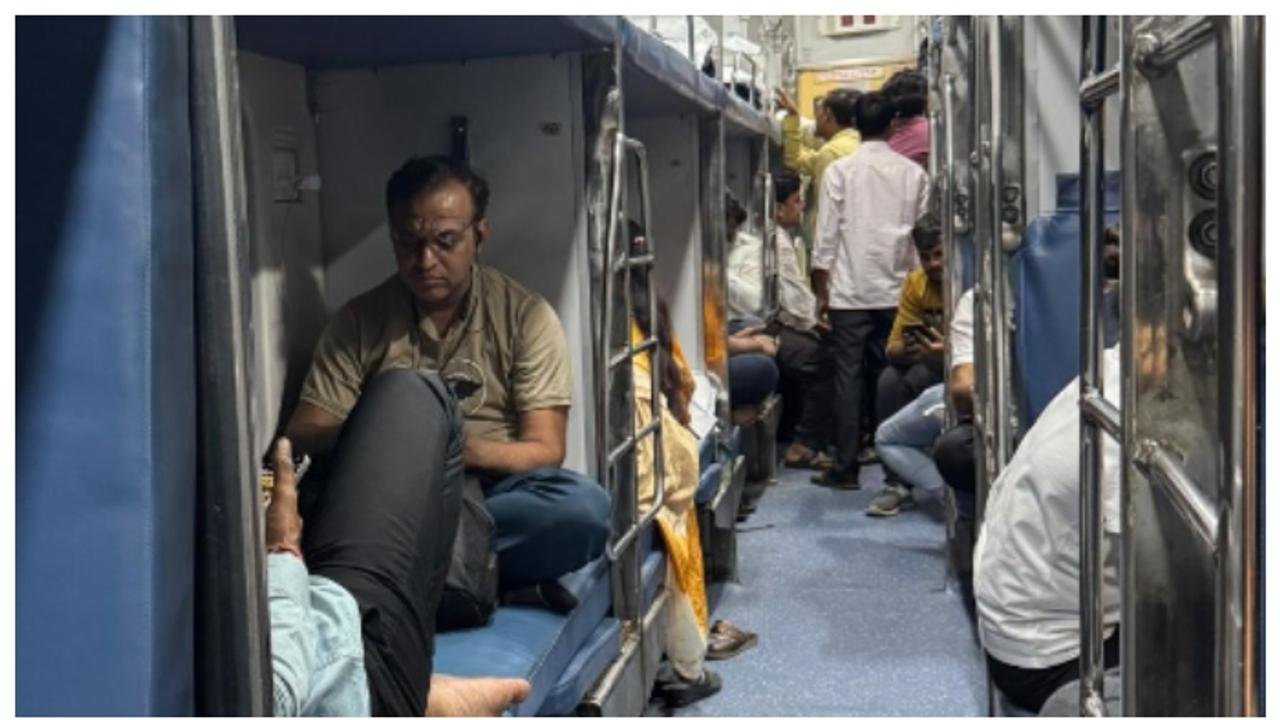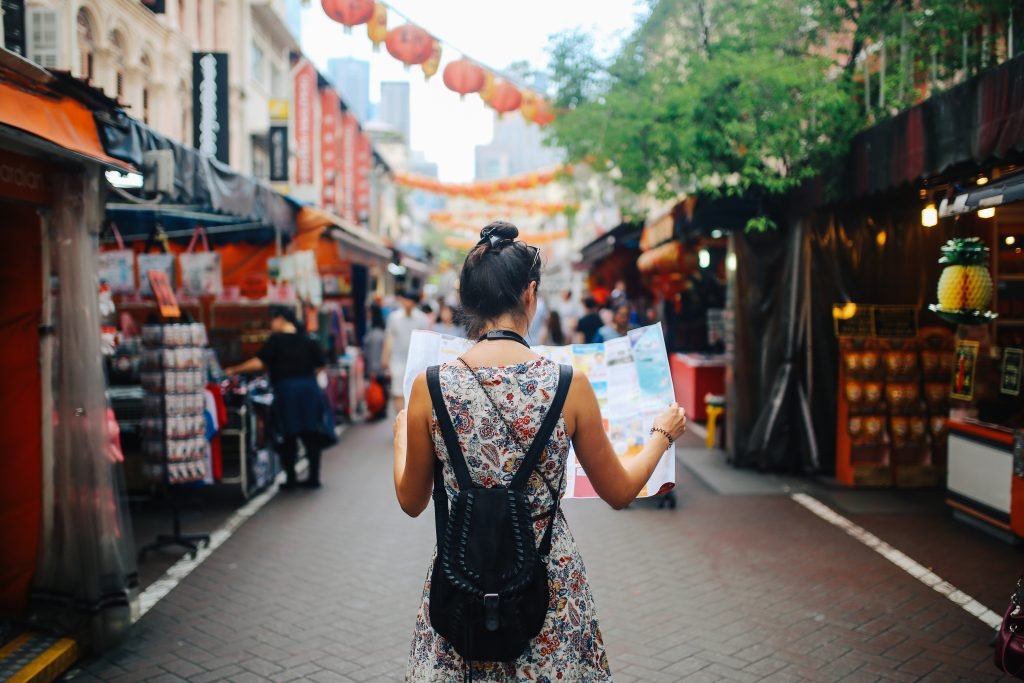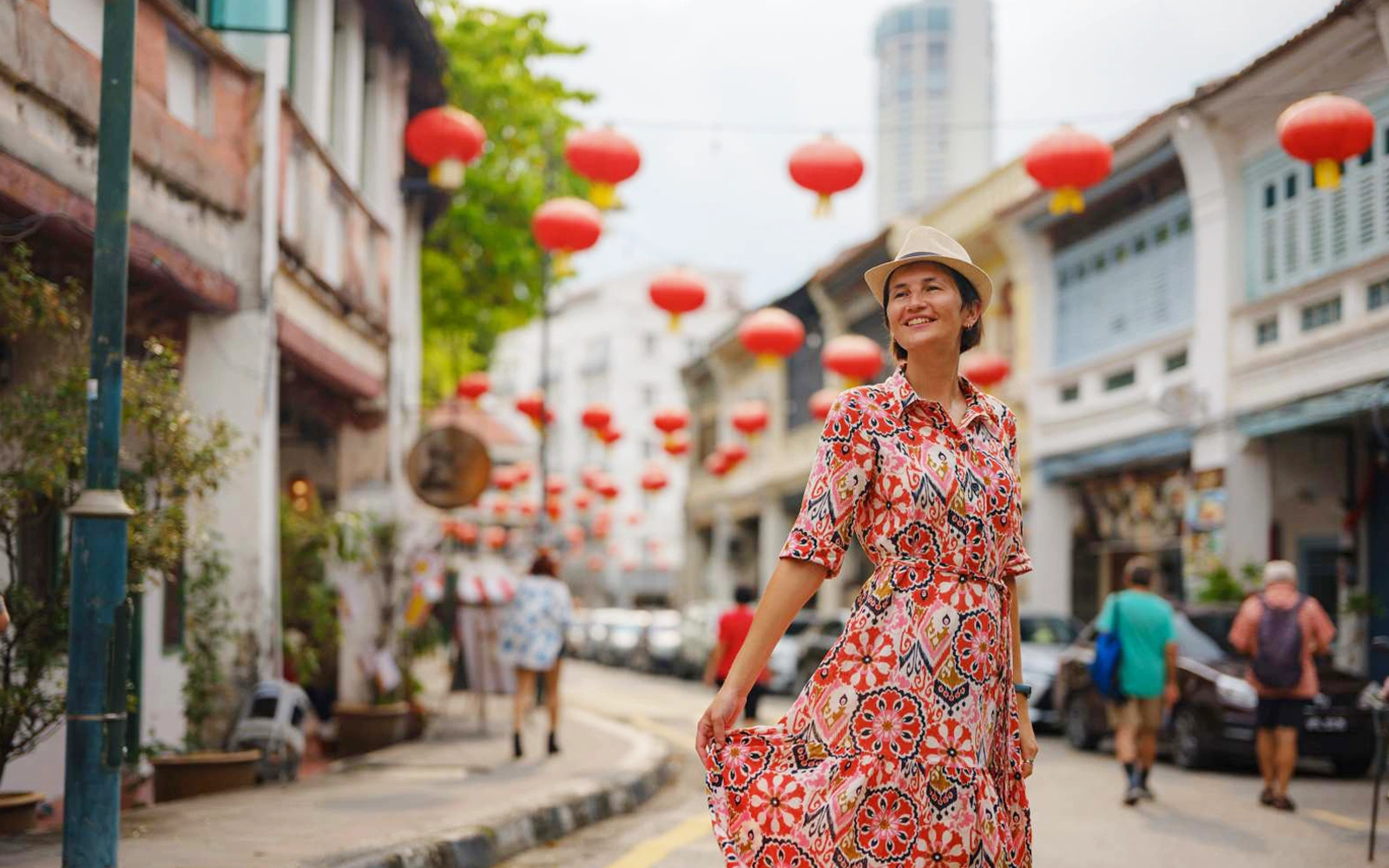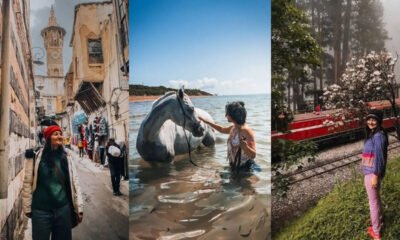Solo Travellers
Solo Female Traveler Praises Indian Railways After Late-Night Security Check, Social Media Post Goes Viral

A woman traveling alone on a night train shared her first-time experience of encountering female officers conducting a security check.
While the Indian Railways often faces criticism regarding the effectiveness of its safety measures, a recent viral LinkedIn post has presented a positive counter-narrative. A woman, traveling alone from Mumbai to Surat, shared her late-night experience aboard a train, which was an unexpected encounter that made her feel secure.
Proactive Security by Female Officers
According to her account, around 11 pm, two female police officers entered her compartment and specifically addressed her by name, “Seat 38 – Poorvi?” Once she confirmed her identity, the officers checked on her well-being and asked if she needed any assistance. They also provided her with a helpline number to use if she required further help. The woman expressed that, despite being a frequent solo traveler, this was her first time experiencing such proactive security.
Public Response and Reflections
An elderly couple nearby was also surprised by the officers’ visit and found the gesture reassuring. They mentioned how this kind of attention was comforting, especially since their own granddaughter often travels alone.
The woman concluded her post by reflecting that, while India may not yet match the safety standards of developed nations, such thoughtful efforts are significant steps forward and bring considerable comfort to passengers. The post quickly gained traction online, inspiring others to share similar positive experiences and earning widespread appreciation for bringing attention to diligent security measures in the railways.
Solo Travellers
Study: Millennials power APAC solo travel surge, digital channels lead the way

Solo travel is no longer a niche. With one in three APAC travellers planning a solo trip in the next 12 months, the trend has become a full-blown movement. Whether driven by a desire for self-discovery, a break from routine, or the simple freedom to go at one’s own pace, solo travellers are reshaping how brands think about engagement, content, and conversion.
Scoot and YouGov’s latest study, “Unpacking the solo travel trend,” explores the mindset of solo travellers across six APAC markets — Singapore, Malaysia, Indonesia, Philippines, Thailand, and Australia — and what it means for marketers eyeing this growing segment.
The study found that solo travel skews younger, with 45% of respondents aged 18 to 34. Women make up a higher share of solo travellers at 56%, compared to 44% for men. In Singapore, the trend is particularly strong among Millennials, who are turning to solo travel for flexibility, emotional reset, and the opportunity to prioritise mental wellbeing.
Don’t miss: Report: 95% of APAC travellers eager for AI
The top reasons for going solo include the freedom to explore without compromise (50%), personal growth (38%), and the need to escape daily life (35%). One in five travellers also said they travelled solo because they had no one to go with, suggesting an untapped opportunity for community-based travel experiences or group-style solo packages.
Digital channels drive solo travel planning
Digital platforms are central to the solo travel journey. For accommodation, travellers turn first to online travel agency websites, followed by hotel sites and reviews. Most flights are booked directly through airline websites or apps, while OTAs and social platforms play supporting roles.
Social media plays a key role in food and activity discovery. Travellers often consult TikTok and Instagram to plan where to eat and what to do. Family recommendations and online reviews also heavily influence decision-making, underscoring the need for brands to maintain consistent and trusted digital footprints.
The study notes that solo travellers prioritise flexibility, peace of mind, and convenience. Offerings such as all-in-one insurance, rebooking flexibility, and integrated travel bundles help reduce planning friction. For travel marketers, this means going beyond awareness-building to remove practical barriers at each touchpoint.
Presence across channels is no longer optional. From OTA listings and hotel partners to influencer content and review platforms, brands need to be present where consumers already are. The solo travel journey is omnichannel and non-linear. Brands that show up with clarity, utility, and relevance are more likely to drive action.
With solo travel on the rise, brands that recognise the solo traveller as a distinct and valuable audience, rather than a secondary segment, will be better placed to capture loyalty, spend, and share of mind.
“While the findings do not represent the end to group and family travel, the way we travel expresses our individuality and allows for self-discovery. Scoot’s white paper sheds light on the behaviour, motivations, preferences and expectations of an emerging segment of travellers today,” said Agatha Yap, director of marketing, communications and loyalty, Scoot.
“With an extensive network especially in the Asia-Pacific, Scoot is excited to be able to play a role in enabling access to some of the most sought-after and yet-to-be discovered destinations, empowering more travellers, whether solo or group, to explore the world with greater confidence and enthusiasm,” she added.
Adding further context to the evolving travel landscape, Booking.com’s 2025” Global AI sentiment report”, unveiled at its Trust Summit in Singapore, highlighted the growing enthusiasm for AI among APAC travellers. The report, based on insights from over 37,000 consumers globally, found that 95% of APAC travellers are excited about AI’s expanding role in travel, with 82% already familiar with the technology and 93% planning to use AI tools in their future trip planning.
The report also points to a shift in trust, with travellers increasingly valuing AI assistants over traditional influencers or peer recommendations. Moreover, there is a strong interest in AI-driven solutions that support responsible travel such as avoiding crowded tourist spots and encouraging experiences that benefit local communities. This growing integration of AI complements broader travel trends focused on personalisation, convenience, and meaningful experiences, and signals new opportunities for travel brands to engage the tech-savvy solo traveller segment.
Accelerate your brand’s growth with AI-first strategies, emerging tech and data-driven experiences. Join 500+ marketing leaders at Digital Marketing Asia 2025 Singapore on 24–25 September to uncover transformative trends, real-world wins and powerful ideas for 2025 and beyond.
Related articles:
Muslim travel index shifts: Malaysia reclaims crown as Indonesia slips
Study: 90% of APAC luxury travellers book with wellness in mind
Malaysia Airlines invites travellers to indulge in ‘Time for premium escapades’
Solo Travellers
The unlikely destination that solo Aussie travellers can’t get enough of

Aussies are increasingly prioritising trips with the person closest to them, themselves! With solo travel becoming increasingly popular, Scoot, the low-cost arm of Singapore Airlines, has today released findings that shed light on the rising popularity of solo travel across the Asia-Pacific region.
The findings show that there’s one destination, travellers can’t get enough of.
Conducted in partnership with YouGov, the research surveyed over 5,000 people – including 1,017 Australians – to explore the motivations, behaviours and attitudes shaping this growing travel trend.
The insights, captured in Scoot’s inaugural white paper, delve into the demographics of solo travellers, their planning habits, destination choices, and the cultural nuances that influence their journeys—offering a timely look at the modern mindset of the self-guided explorer.
Top Five solo travel wishlist destinations (global) for Australians:
1. Australia (45 per cent) (domestic travel)
2. UK (15 per cent)
3. US (14 per cent)
4. New Zealand (13 per cent)
5. Canada (10 per cent)
With so many Australians boasting family connections in the likes of UK, New Zealand and US, it is also no surprise that visiting friends and family surged to the top of the list as a driver for solo travellers.
To reach all of these destinations, solo travellers continue to prioritise affordable air travel options, with almost two-thirds (62 per cent) opting for economy class and two in five (40 per cent) considering affordability as a top factor when choosing an airline. This underscores the importance of value for those navigating the world on their own.
Solo Travel Emerges as Mainstream Travel Choice
Once seen as a niche pursuit, solo travel in Australia has increasingly become a common lifestyle choice. Eight in 10 (81 per cent) of solo travellers in Australia went on solo trips in the past year, with more than half (54 per cent) undertaking two or more trips. The interest in solo travel is expected to continue, with close to nine in 10 (87 per cent) Australians planning to take a solo trip in the next 12 months.
A large proportion of respondents from Australia (83 per cent) are likely to recommend solo vacations to others. This growing trend is closely tied to broader lifestyle shifts, from increased demands at work and home to a rising emphasis on personal well-being. A total of 56 per cent of solo travellers from Australia cite freedom and flexibility to plan their own itineraries as their primary motivation, while 45 per cent view solo travel as an opportunity to take a break and focus on themselves. Notably, another 44 per cent value the opportunity to pursue activities and hobbies they enjoy.
In Australia, solo getaways have become a modern ritual for self-care and self-discovery. Scoot enables these journeys by connecting Australia to popular Southeast Asian destinations such as Indonesia and Thailand – renowned for their wellness and personal growth experiences. Research also shows solo travellers continue to favour Asia for its affordability and rich experiences.
Scoot’s findings dovetail the rise in mindfulness, health and wellness, highlighting how travel, especially solo travel has evolved from simply being a leisure activity to one that travellers growingly seek for reflection and self-discovery.
“For many Australians, it’s no longer just about ticking off bucket list destinations, it’s about slowing down, reconnecting with yourself, and embracing the destination. This white paper highlights the mindset shift towards solo travel. Australians are embracing solo trips not out of necessity, but out of choice. Whilst we still have amazing journeys with friends and family, solo travel sparks a sense of lone adventure where you can go your own way and choose a unique journey bespoke to you.” Adam Kelly, General Manager, Scoot Australia.
Whether they are setting off for wellness, wanderlust, or a bit of both, Scoot’s extensive network to over 70 destinations, products, and affordable fares allow travellers to explore the world confidently,” he added.
Research and planning are key priorities for solo travellers
While independence may be one of the core appeals, solo travellers in Australia today are far from impulsive. In fact, they are highly intentional in their approach with planning for their trips. Aside from booking flights, the main priorities for half or more of these travellers include accommodation selection (63 per cent), budget management (53 per cent), and safety considerations (45 per cent). They rely heavily on online travel agencies (32 per cent), hotel and airline websites or apps (54 per cent), and recommendations from family and friends (34 per cent) to help them make informed decisions with flight and accommodation bookings.
Japan, Singapore, and Thailand top Asia-Pacific travel wishlist
The white paper also revealed a trend for easy-to-reach APAC hotspots, with the likes of Japan, Singapore and Thailand named as some of the top solo locations for Australians to visit within the Asia-Pacific region.
Top 10 Solo Travel wishlist destinations in APAC for Australians (excluding Australia/domestic travel):
- New Zealand
- Japan
- Singapore
- Thailand
- China
- Vietnam
- Malaysia
- Indonesia
- Philippines
- South Korea / India (tie)
These choices indicate a desire for personal connections, vibrant cultures and nature escapes, reflective of the most popular types of solo trips: reconnecting with loved ones, visiting friends and family (55 per cent) beach holidays (39 per cent), culture and history (39 per cent) city breaks (34 per cent), and visting countryside and rural areas (34 per cent). This echoes the cultural shift towards experience-led holidays, where travel is seen as a form of informal education and cultural immersion, especially for those choosing to explore the world solo in pursuit of personal enrichment.
Overall, the white paper reveals a strong preference for destinations in UK, US and New Zealand as the top global destinations that Australian travellers would like to head to on a solo trip in the next 12 months.
Solo Travellers
Solo travel gaining momentum among Malaysians, survey shows

Once a niche pursuit, solo travel among Malaysians has become more popular, especially among younger travellers. Six out of 10 respondents took solo trips in the past year, with almost a third (27%) of them having embarked on three or more such trips in the same period, according to a new YouGov survey.
Millennials are at the forefront of this shift, making up 38% of current and aspiring solo travellers.
The research, commissioned by low-cost carrier Scoot, involved over 5,000 respondents across five countries within the Asia-Pacific region – Malaysia, Singapore, Thailand, Indonesia and Australia – offering a window into the mindset of today’s independent explorer.
Some 86% of Malaysian respondents said they would recommend solo travel to others: a growing trend tied to broader lifestyle shifts, from increased demands at work and home to a rising emphasis on personal well-being.
Meanwhile, 56% of solo travellers cited freedom and flexibility to plan their own itineraries as their primary motivation; while 53% viewed solo travel as an opportunity to take a break and focus on themselves.
Notably, 49% of the respondents said they value the independence of exploring new places at their own pace.
Respondents from Malaysia were also the biggest group to cite solo travel as a catalyst for pursuing activities or hobbies they personally enjoy (47%, compared to the regional average of 43%).
This reflects a growing desire among Malaysians to use travel as a means to reconnect with their interests away from routine or group expectations.
What do Malaysians look for?
The findings also show that solo travellers are highly intentional in their approach: an overwhelming majority (95%) engaged in some form of planning for their trips.
Aside from flight bookings, main priorities for more than half of these travellers include budget management (56%), accommodation (52%), and safety considerations (51%).
They relied heavily on online travel agencies, hotel websites, and online review platforms to help them make informed decisions about their flight and accommodation bookings. For food and activity recommendations, they relied on social media.
The survey further reveals a strong preference for Asia-Pacific destinations among Malaysian respondents, with nine in 10 planning trips within the region in the next 12 months.
Malaysia ranks as their top travel location, with 21% preferring to travel solely within the country, and 71% open to domestic and international trips.
Thailand (25%), Japan (23%), and Indonesia (22%) emerged as the top three international travel destinations in the year ahead.
These choices indicate a desire for vibrant cultures, nature and seaside escapes, reflective of the most popular types of solo trips: cultural and historical experiences (46%), city breaks (43%), beach getaways (42%), and nature holidays (41%).
To reach these destinations, respondents from Malaysia continue to prioritise affordable air travel options, with 70% opting for economy class and 28% choosing low-cost carriers – underscoring the importance of value as a key driver for those navigating the world on their own.
-

 Brand Stories2 weeks ago
Brand Stories2 weeks agoBloom Hotels: A Modern Vision of Hospitality Redefining Travel
-

 Brand Stories1 week ago
Brand Stories1 week agoCheQin.ai sets a new standard for hotel booking with its AI capabilities: empowering travellers to bargain, choose the best, and book with clarity.
-

 Destinations & Things To Do2 weeks ago
Destinations & Things To Do2 weeks agoUntouched Destinations: Stunning Hidden Gems You Must Visit
-

 Destinations & Things To Do1 week ago
Destinations & Things To Do1 week agoThis Hidden Beach in India Glows at Night-But Only in One Secret Season
-

 AI in Travel2 weeks ago
AI in Travel2 weeks agoAI Travel Revolution: Must-Have Guide to the Best Experience
-

 Brand Stories1 month ago
Brand Stories1 month agoVoice AI Startup ElevenLabs Plans to Add Hubs Around the World
-

 Brand Stories3 weeks ago
Brand Stories3 weeks agoHow Elon Musk’s rogue Grok chatbot became a cautionary AI tale
-

 Asia Travel Pulse1 month ago
Asia Travel Pulse1 month agoLooking For Adventure In Asia? Here Are 7 Epic Destinations You Need To Experience At Least Once – Zee News
-

 AI in Travel4 weeks ago
AI in Travel4 weeks ago‘Will AI take my job?’ A trip to a Beijing fortune-telling bar to see what lies ahead | China
-

 Brand Stories2 weeks ago
Brand Stories2 weeks agoContactless Hospitality: Why Remote Management Technology Is Key to Seamless Guest Experiences









You must be logged in to post a comment Login